
From
Dusk ‘til Dawn
Air Berlin (AB) is in serious trouble,
and not for the first time. This time, however, it is unclear
whether the troubled carrier will see the sun rise again.
AB has been battling mounting debt,
increasing customer dissatisfaction, and low yields—even
lower than European average—for quite awhile, but
now they are under crossfire by competitors who aim to capitalize
on what sources say are AB’s weaknesses and unclear
business model:
Ryanair (FR), the enfant terrible
of the LCCs in Europe, is poised for further expansion and
is attacking AB head on.
For example, FR announced the re-start
of German domestic flights for the winter schedule; but
they will now start in September on the profitable Cologne-Berlin
route.
Currently, about 44 flights are
flown between CGN and BER daily, about half by LH low-cost
subsidiary Germanwings (4U) and half by AB. FR also plans
to initially base five aircraft in BER and offer five daily
connections between BER and CGN for starters.
And FR introduced itself in no
unclear terms, offering prices in the 20 Euro (U.S. $22.75)
range, which were immediately matched by 4U, and then were
lowered to 10 Euro (U.S $11.38) one-way.
FR has made clear that they wish
to tackle AB’s position as second largest German carrier,
and it is hard to see how AB can fight back.
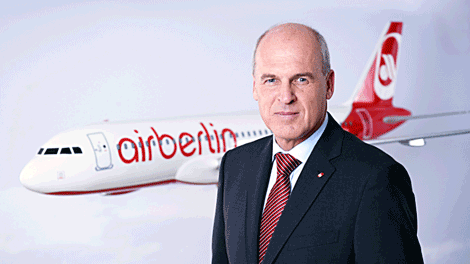 While a price war is hard to win in any case, AB simply
doesn’t have the financial resources at their disposal,
while cash-rich FR has announced that they intend to serve
“all major German airports except FRA before the end
of 2016.” But with FR’s existing services to
Frankfurt-Hahn (HHN), they may well compete in the low-cost
sector for passengers who do not mind a 90-minute bus ride,
even in FRA.
While a price war is hard to win in any case, AB simply
doesn’t have the financial resources at their disposal,
while cash-rich FR has announced that they intend to serve
“all major German airports except FRA before the end
of 2016.” But with FR’s existing services to
Frankfurt-Hahn (HHN), they may well compete in the low-cost
sector for passengers who do not mind a 90-minute bus ride,
even in FRA.
Stefan Pichler, (right) the current
CEO of Air Berlin, took over for Wolfgang Prock-Schauer
on February 1, 2015. Many of AB’s issues are rooted
in decisions made by Joachim Hunold (who led AB’s
disastrous expansion in the 1990s and early 2000s and reportedly
also owned most of the aircraft AB operated by means of
various foundations, leasing them to AB at well above market
rates) and former controversial CEO Hartmut Mehdorn, nicknamed
“sanitizer” in Germany, and later the CEO of
the no-less troubled Berlin-Brandenburg airport until March
31st, 2015. Mehdorn followed Hunold in 2011 and stepped
down in 2013.
Although Air Berlin is advertised
as a “German” carrier and it bears the German
capital in its name, since 2006 AB has been headquartered
in Rickmansworth, UK—allegedly for tax reasons. Former
CEO Joachim Hunold created today’s AB by integrating
former German holiday carrier LTU, Deutsche BA (The German
subsidiary of British Airways), the Austrian NIKI, and the
Swiss Belair.
AB has a somewhat colorful history:
Founded in 1978 by U.S. citizen Kim Lundgren, it was headquartered
in Miami because until the German reunification and dropping
of the allied air traffic restrictions in 1990, only aircraft
registered in one of the allied states were permitted to
operate to and from Berlin. In 1991, when Joachim Hunold
took over, the registry was moved to Germany and the business
model changed entirely.
While the focus on nearby sun destinations
such as ever-popular Palma de Mallorca (PMI) paid off, the
mounting debts of AB proved to be a heavy burden, which
Hunold tried to alleviate by further expansion. Attempts
to take over German holiday carrier Condor (DE) in 2007
and Germania (ST) in 2008 however failed.
As the attempts to diversify the
newly created carrier were not well thought through, AB
was neither a full-fledged legacy carrier such as Lufthansa
(LH) nor really a charter or holiday carrier anymore, such
as SunExpress (XQ) or Condor (DE).
Air Berlin resorted to measures
that usually spell doom for most airline businesses—selling
off what little assets they had and leasing them back, plus
outsourcing whatever activity could be outsourced.
These activities prompted the joke
that Mehdorn, CEO of AB at that time, “was an avid
believer in being able to make a Ponzi scheme work out.”
Air Berlin had divested themselves
of aircraft, buildings, ULDs, and even spare engines and
crew uniforms. With the damsel already in the greatest distress,
the knight in shining armor arrived in December 2011, when
Etihad (EY) upped their share from 2.99 percent to 29.21
percent at a cost of 73 million Euros (U.S. $93 million)
in order to gain a better foothold in the German market.
In March 2012, AB joined Oneworld
and thus gained access to additional routes and destinations
of the Oneworld partners. This measure wasaimed at targeting
business and leisure travelers who valued interconnectivity;
however, the cutbacks in staff and systems gave AB a notorious
reputation for not dealing with customer complaints and
inquiries. According to figures obtained by the German business
daily HANDELSBLATT in August 2013, more than 30,000 complaints
at AB were unresolved at that time and many were closed
without any response to the customer. The average time it
took AB to respond to any inquiry or complaint was eight
months.
Subsequently, load factors on holiday
and business routes were not as expected, so AB resorted
to giving up routes and shrinking both network, staff, and
fleet in order to ferry passengers into AUH where they connected
to EY flights onwards. As cash was running out again, AB
resorted to selling their frequent flyer program called
“TopBonus” to EY for 184 Million Euros (U.S.
$234.5 million) in December 2012.
Further measures included AB taking
over cabin interiors that had been replaced at EY in favor
of more modern equipment, joint maintenance for aircraft,
and staff reductions—measures well received by the
stock market, but not so much by the flying public, who
started to see AB as an EY subcontractor at best.
After the 2013 earnings report
showed losses of 314.5 million Euros (U.S. $400.8 million),
AB’s bankruptcy was avoided by its knight EY who—albeit
reluctantly—had again provided a third-tier convertible
bond totaling 300 million Euros (U.S. $383 million). Although
it rescued AB from immediate doom, this measure proved to
be a double-edged sword since it not only made the German
air transport watchdog, the LBA, question the financial
standing of AB and its business model, but also understandably
angered competitor LH who saw these measures as an illegal
aid to the struggling competitor.
A 3rd tier convertible bond gives
the creditor the option to convert the loan into shares
at a given date. However, EY is unable to exercise this
option since it would raise EY’s share beyond the
50 percent limit, which would make AB lose its European
registry.
Similar doubts about the financial
standing of former Air Cargo Germany (6U) resulted in immediate
revocation of ACG’s operating permit on April 18th,
2013.
 The LBA’s doubts about the
validity of AB’s business model materialized in early
October 2014 when the LBA refused to sign off on 34 EY/AB
codeshare flights which, according to the LBA, “were
not in accordance with the bilateral air services agreement
between Germany and the UAE.” Although these codeshare
flights had been approved in the previous six years, the
LBA insisted that there was no legal basis for further approval,
likely based on AB’s questionable financial standing
and their rebuilt business model as a feeder for EY and
its subsidiaries.
The LBA’s doubts about the
validity of AB’s business model materialized in early
October 2014 when the LBA refused to sign off on 34 EY/AB
codeshare flights which, according to the LBA, “were
not in accordance with the bilateral air services agreement
between Germany and the UAE.” Although these codeshare
flights had been approved in the previous six years, the
LBA insisted that there was no legal basis for further approval,
likely based on AB’s questionable financial standing
and their rebuilt business model as a feeder for EY and
its subsidiaries.
Although German minister for transport
and infrastructure Alexander Dobrindt had ordered the LBA
to approve the code share flights in question, the LBA insists
that no precedent had been set, leaving AB’s most
viable business in question.
In the meantime, AB has announced
it will reduce capacity (4.5 percent less seats offered
in the March to June period of 2015 than in 2014) and its
2014 earnings report showed even greater losses of 377 Million
Euros (US$429.11 million ).
Although CEO Stefan Pichler says
that he is “cautiously optimistic” about getting
AB back into the black in 2016, with the attack launched
by FR and the uncertain future of their codeshare flights
with EY, that seems more than questionable. For EY, it may
be more commercially viable to finance the upstart of an
Alitalia Germany.
Jens/Geoffrey |




 There
is no proactive tracking, not with the airlines, not with UPS, not
with FedEx.
There
is no proactive tracking, not with the airlines, not with UPS, not
with FedEx.  Today’s
customer wants to know if there is an app that [they] can load up
on [their] phone to follow [their] shipment through its transportation
chain.
Today’s
customer wants to know if there is an app that [they] can load up
on [their] phone to follow [their] shipment through its transportation
chain.
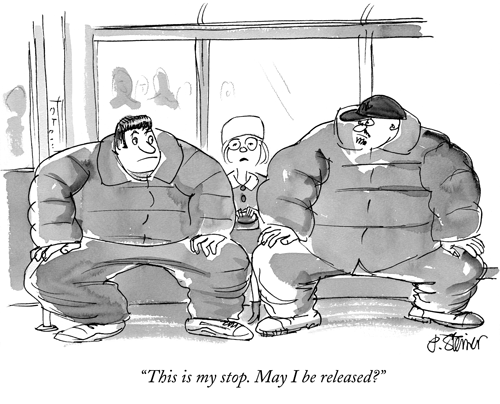


 While a price war is hard to win in any case, AB simply
doesn’t have the financial resources at their disposal,
while cash-rich FR has announced that they intend to serve
“all major German airports except FRA before the end
of 2016.” But with FR’s existing services to
Frankfurt-Hahn (HHN), they may well compete in the low-cost
sector for passengers who do not mind a 90-minute bus ride,
even in FRA.
While a price war is hard to win in any case, AB simply
doesn’t have the financial resources at their disposal,
while cash-rich FR has announced that they intend to serve
“all major German airports except FRA before the end
of 2016.” But with FR’s existing services to
Frankfurt-Hahn (HHN), they may well compete in the low-cost
sector for passengers who do not mind a 90-minute bus ride,
even in FRA. The LBA’s doubts about the
validity of AB’s business model materialized in early
October 2014 when the LBA refused to sign off on 34 EY/AB
codeshare flights which, according to the LBA, “were
not in accordance with the bilateral air services agreement
between Germany and the UAE.” Although these codeshare
flights had been approved in the previous six years, the
LBA insisted that there was no legal basis for further approval,
likely based on AB’s questionable financial standing
and their rebuilt business model as a feeder for EY and
its subsidiaries.
The LBA’s doubts about the
validity of AB’s business model materialized in early
October 2014 when the LBA refused to sign off on 34 EY/AB
codeshare flights which, according to the LBA, “were
not in accordance with the bilateral air services agreement
between Germany and the UAE.” Although these codeshare
flights had been approved in the previous six years, the
LBA insisted that there was no legal basis for further approval,
likely based on AB’s questionable financial standing
and their rebuilt business model as a feeder for EY and
its subsidiaries.
 Dear
Geoffrey,
Dear
Geoffrey,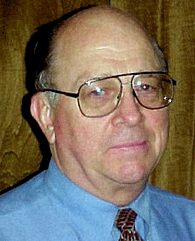 I
wanted to share with you that I am retiring from the air cargo
business and have sold the assets of Cargo Data Management to
the company’s employees and a group of investors from the
Pacific Rim. This is our 25th year in business and just to have
survived the airline / air cargo maelstrom for this length of
time is a feat in itself. We have reinvented ourselves several
times just to stay ahead of the technology curve and installed
our first Internet hosted fully integrated air cargo system using
all e-AWB’s in 2003 with Cebu Pacific in Manila. It has
been a great ride that started with Arrow , Midway and Evergreen
in 1991 all signing contracts in the same week and wanting immediate
installation…which brings to mind the old phrase “be
careful what you wish for . . .
I
wanted to share with you that I am retiring from the air cargo
business and have sold the assets of Cargo Data Management to
the company’s employees and a group of investors from the
Pacific Rim. This is our 25th year in business and just to have
survived the airline / air cargo maelstrom for this length of
time is a feat in itself. We have reinvented ourselves several
times just to stay ahead of the technology curve and installed
our first Internet hosted fully integrated air cargo system using
all e-AWB’s in 2003 with Cebu Pacific in Manila. It has
been a great ride that started with Arrow , Midway and Evergreen
in 1991 all signing contracts in the same week and wanting immediate
installation…which brings to mind the old phrase “be
careful what you wish for . . . 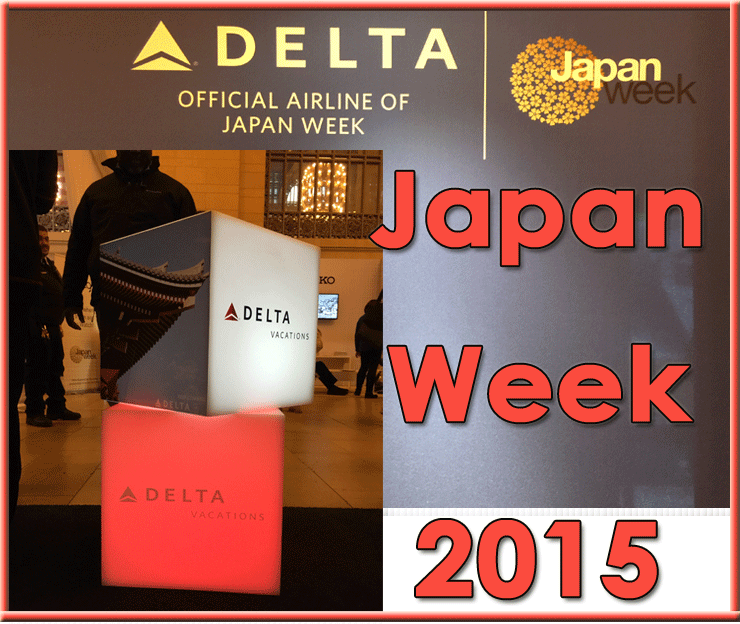
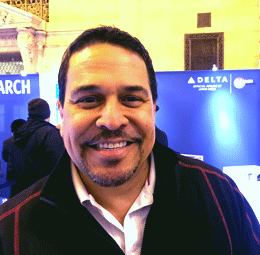 There
were several exhibitors and sponsors at Japan Week, but Delta
Air Lines had a lively milling of the young and the old, and centered
specifically on a set up of i-Pads and flat-screen TVs that served
as leaderboards for a game called Sky Search. We spoke with Gregory
P. Fisher, Specialist, Global Meetings & Events, to learn
about Delta’s presence at Japan Week.
There
were several exhibitors and sponsors at Japan Week, but Delta
Air Lines had a lively milling of the young and the old, and centered
specifically on a set up of i-Pads and flat-screen TVs that served
as leaderboards for a game called Sky Search. We spoke with Gregory
P. Fisher, Specialist, Global Meetings & Events, to learn
about Delta’s presence at Japan Week. “Almost everybody, if they’re
traveling 9, 10, 12 hours, appreciates the full recline of our
seats. It’s really designed for the business traveler. We
do a lot of corporate travel, which will be married with a Sky
Club package, so they sleep on the way over, get up, have breakfast,
get off the plane, go to a Sky Club, shower, go to a meeting,
and then come right back.
“Almost everybody, if they’re
traveling 9, 10, 12 hours, appreciates the full recline of our
seats. It’s really designed for the business traveler. We
do a lot of corporate travel, which will be married with a Sky
Club package, so they sleep on the way over, get up, have breakfast,
get off the plane, go to a Sky Club, shower, go to a meeting,
and then come right back.
 Vital
Views 1975-2015
Vital
Views 1975-2015 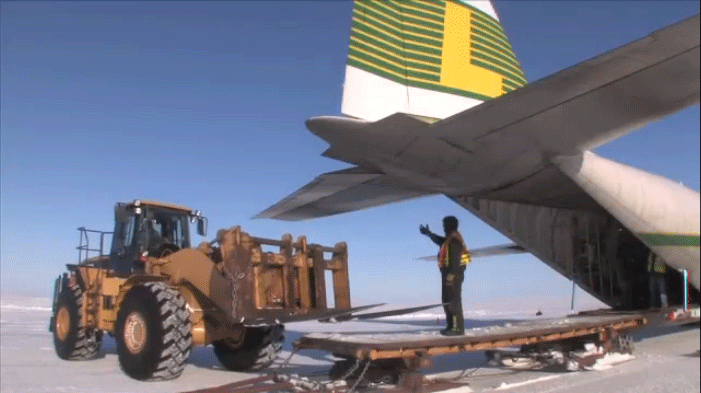
 David
Abney, chief operating officer – UPS and president,
UPS Airlines, offered these words of change and challenge:
“The air cargo industry has seen much change and many
challenges in the past year. There are the economic and
regulatory pressures, security, and environmental concerns,
rising fuel prices and ever-expanding supply chains made
efficient with globalization and effective network management.
Despite these challenges, the demand for air cargo and express
shipments has continued to grow—and is forecasted
to keep growing to support global sourcing, production,
distribution, and consumption.”
David
Abney, chief operating officer – UPS and president,
UPS Airlines, offered these words of change and challenge:
“The air cargo industry has seen much change and many
challenges in the past year. There are the economic and
regulatory pressures, security, and environmental concerns,
rising fuel prices and ever-expanding supply chains made
efficient with globalization and effective network management.
Despite these challenges, the demand for air cargo and express
shipments has continued to grow—and is forecasted
to keep growing to support global sourcing, production,
distribution, and consumption.”

